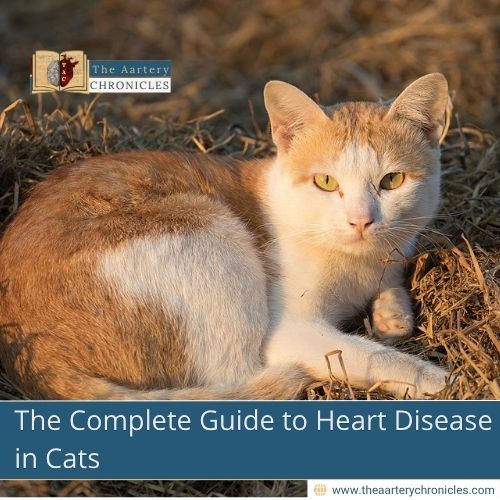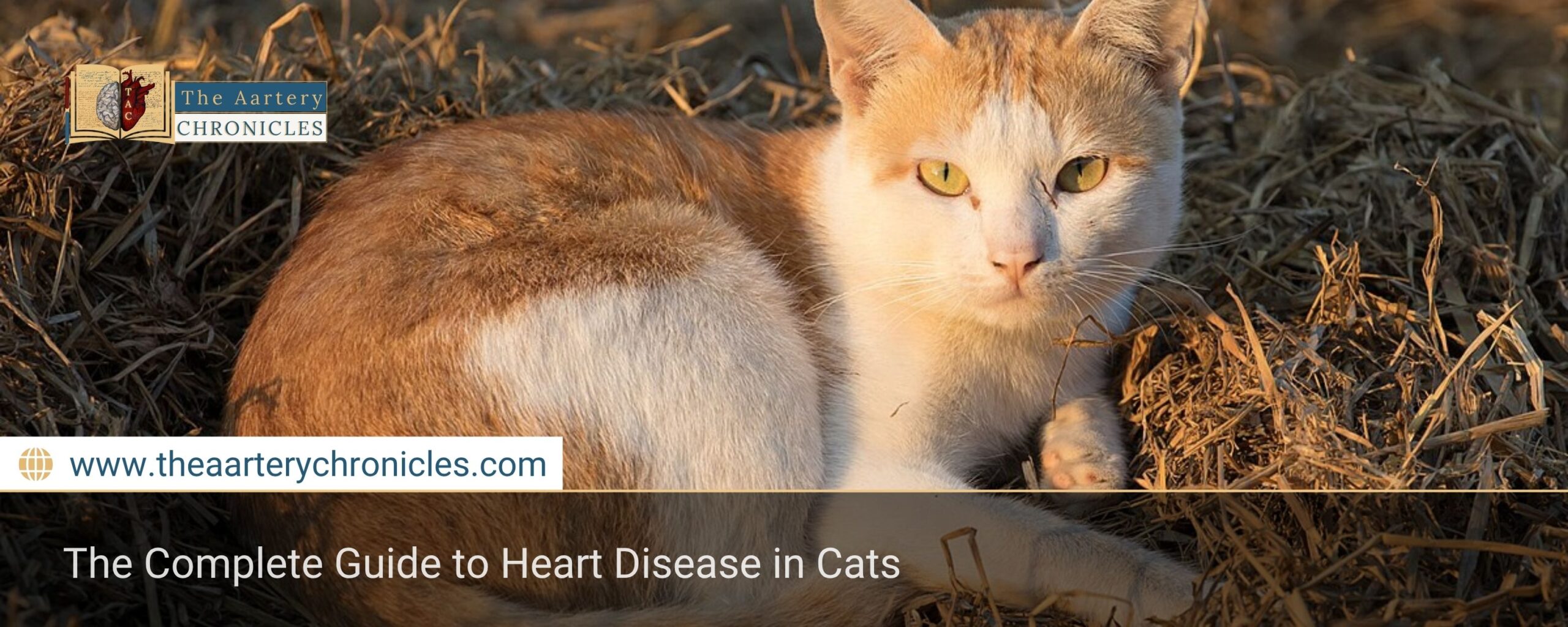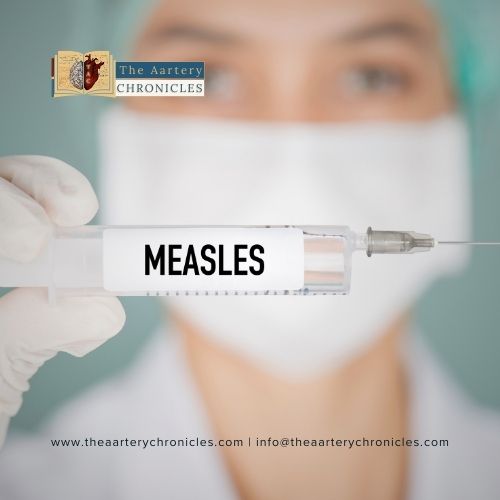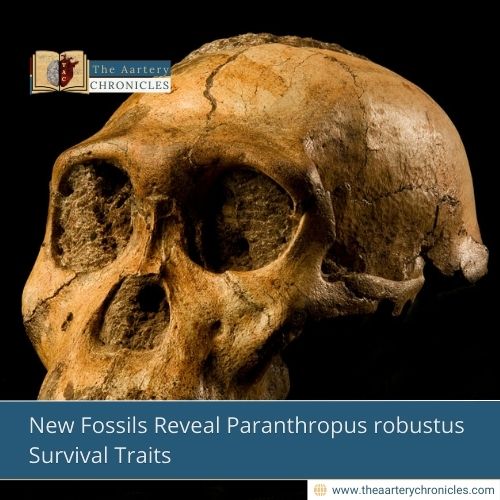

The Complete Guide to Heart Disease in Cats
Introduction
Heart disease in cats is a group of conditions that affect the heart and can seriously impact your feline’s health. Although cats are known to be independent and resilient animals, they are still susceptible to a variety of heart conditions, which often go undetected until their advanced stages. Early diagnosis of heart disease is essential to improving your cat’s quality of life and preventing serious complications, such as heart failure or blood clots.
Types Of Heart Disease In Cats
Feline heart disease can be classified into several categories, depending on the nature of the pathology. Here are the main types:
1. Hypertrophic Cardiomyopathy (HCM) Hypertrophic cardiomyopathy
HCM is the most common form of heart disease in cats. It is characterized by thickening of the walls of the heart muscle, which reduces the heart’s ability to pump blood effectively. HCM is often inherited and commonly affects breeds such as the Maine Coon and Ragdoll.
2. Restrictive Cardiomyopathy (RCM)
In this condition, the heart muscle becomes stiff and unable to fully relax while filling with blood. This limits the amount of blood that can enter the heart and impairs its overall function.
3. Dilated Cardiomyopathy (DCM)
This is a rare condition in cats, in which the heart becomes dilated and unable to contract effectively. DCM used to be more common when cats’ diets were deficient in taurine, an essential amino acid. Today, with improved nutritional awareness, DCM is less common.
4. Congenital Heart Defects
Some cats are born with structural heart defects, such as ventricular septal defects or valvular stenosis. These congenital conditions can affect the heart’s ability to function properly and may require monitoring and, in some cases, surgery.
5. Congestive Heart Failure (CHF)
This is a condition in which the heart is no longer able to pump blood effectively, causing fluid to build up in the lungs or abdomen. Congestive heart failure can result from various forms of cardiomyopathy and is a leading cause of death in cats with advanced heart disease.
Causes Of Heart Disease In Cats
The causes of feline heart disease can vary, but include genetic, nutritional, and infectious factors. Some of the main factors that contribute to the development of heart disease in cats are:
- Genetic factors: Some cat breeds are more predisposed to developing heart disease, particularly hypertrophic cardiomyopathy. Breeds such as the Maine Coon and Ragdoll have a genetic predisposition to this condition.
- Taurine Deficiency: In the past, a diet lacking taurine was a major cause of dilated cardiomyopathy in cats. Today, most commercial cat foods contain adequate amounts of taurine, reducing the incidence of this form of heart disease.
- Viral infections: Some viral infections, such as feline leukemia virus (FeLV) or feline immunodeficiency virus (FIV), can increase the risk of heart disease.
- High blood pressure: Untreated high blood pressure can lead to heart damage, such as left ventricular hypertrophy, similar to that seen in hypertrophic cardiomyopathy.
Symptoms Of Heart Disease In Cats
Symptoms of heart disease in cats can vary greatly, depending on the severity of the disease and the specific type of heart disease. Often, cats show few obvious signs of heart disease until the condition progresses. However, some common symptoms include:
- Lethargy: A cat with heart disease may be less active than usual and appear fatigued even after minimal exertion.
- Difficulty breathing: Dyspnea (difficulty breathing) is a common symptom in advanced heart disease, often due to fluid buildup in the lungs.
- Cough: Although coughing is not as common in cats with heart disease as it is in dogs, it can still be present in some cases.
- Loss of appetite: Cats with heart disease often eat less and may lose weight.
- Fainting or Collapse: In severe cases, cats may experience syncope (fainting) due to reduced blood circulation.
- Edema: Fluid accumulation in the abdomen or limbs may be a sign of congestive heart failure.
In some cases, cats with hypertrophic cardiomyopathy may develop thrombi (blood clots), which can cause sudden paralysis of the hind legs and severe pain. This condition is known as aortic thromboembolism and requires emergency treatment.
Diagnosis Of Heart Disease In Cats
Diagnosing feline heart disease requires a combination of physical examination and specialized diagnostic tests. Some of the most common tests used to diagnose heart disease in cats include:
- Auscultation: Your veterinarian may detect heart murmurs, arrhythmias, or abnormal sounds through the use of a stethoscope during the physical exam.
- Echocardiography: This is the most accurate diagnostic test to evaluate the structure and function of the heart. It uses ultrasound to visualize the size of the heart chambers, the thickness of the walls, and the valve function.
- Electrocardiogram (ECG): An ECG measures the electrical activity of the heart and can help identify arrhythmias, or problems with electrical conduction.
- Chest X-ray: Chest X-rays can detect an enlarged heart and fluid in the lungs or abdomen.
- Blood tests: Blood tests may be used to measure levels of electrolytes, proteins, and markers of heart damage, such as B-type natriuretic peptide (BNP).
Treatment Of Heart Disease In Cats
Treatment of heart disease in cats depends on the severity and type of disease. Although feline heart disease is often chronic and incurable, there are many treatment options that can help manage symptoms and improve your cat’s quality of life.
- Medications: Medications are commonly used to improve heart function and manage the symptoms of heart failure. Some medications include:
- Beta-blockers (such as atenolol) to reduce heart rate and improve heart function.
- ACE inhibitors (such as enalapril) to lower blood pressure and reduce strain on the heart.
- Diuretics (such as furosemide) to reduce fluid buildup in the lungs or abdomen.
- Anticoagulants (such as heparin or clopidogrel) to prevent blood clots.
- Diet: A low-sodium diet may be recommended to reduce water retention and ease the burden on the heart. Additionally, taurine supplements may be added if nutritional deficiencies are present.
- Regular Monitoring: Cats with heart disease require frequent veterinary check-ups to monitor the progress of the disease and adjust therapies based on symptoms and test results.
Prevention Of Heart Disease In Cats
While not all heart disease is preventable, there are some steps you can take to reduce your risk:
- Proper nutrition: Make sure your cat receives a balanced diet with all essential nutrients, including taurine.
- Regular Veterinary Monitoring: Perform regular veterinary visits to detect early signs of heart disease.
- Genetic Testing: Some predisposed breeds may benefit from genetic testing to identify predisposition to hypertrophic cardiomyopathy.









